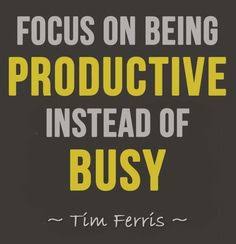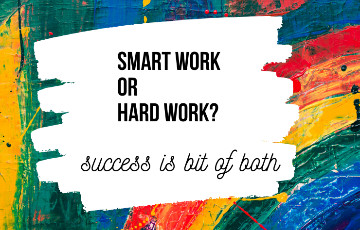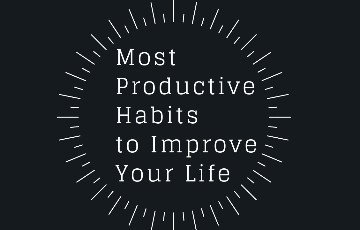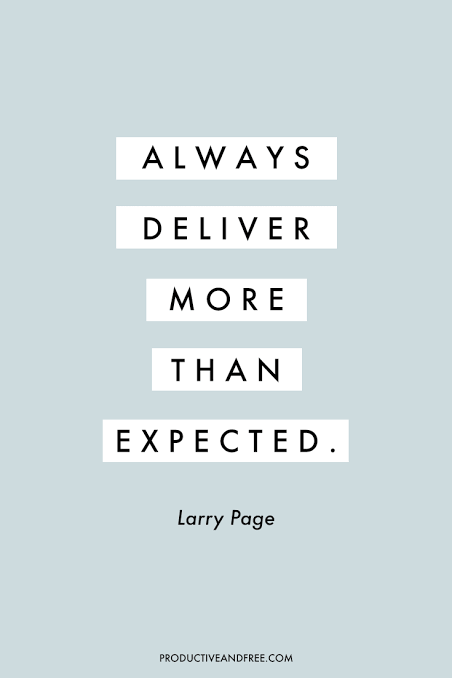
In short, Digital Minimalism is:
- Technology and Internet-Applications should be used purposefully. Not habitually.
- Whenever we feel upset, bored, or distressed, we tend to open our internet and immerse ourselves in to get short-term relief. This is bad. Don’t use technology to get mental relief.
- Put people before technology.
- Digital minimalism is not about rejecting technology and its advancements. It is about using technology purposefully to make life easier but not make life depended on it.
- Digital minimalism is about “what digital, communicational, and technological tools add the most value to our lives and how optimal we can use it?”.
- Digital Minimalism is about clearing digital-noise that distracts your productivity.
How Digital Minimalism Boosts your Productivity?
a. Saves Time:
What happens when we see “Suggested stories” or “Top Stories”? We get dragged away easily from the core issue that we came looking for. Top tweets and posts will steal a considerable amount of your productive time away. But with digital minimalism, you will start using your digital-space for serving a useful purpose. You become productive by doing things that add value.
b. The clarity for Productivity:
By restricting yourself from distractions, you will become clear about what you want. This clarity helps you in picking the right track rather than absorbing everything on the digital platform. You will start using digital-space with purpose. This logic supports you in becoming productive with the time you have.
c. Health Perspective:
Needless to say, reduced screen-time, optimal screen-time is important for your physical and mental health. Staying fit is important for any individual to stay productive.
Takeaway:
Initially, digital minimalism can be difficult to take in and practice. But people who have adopted it are proof of how they are doing more than others. Productivity increases when you start digital minimalism.

Being digitally clean is showing considerable results in increasing an individual’s productivity every day.
What are the important Digital Cleaning Tips?
Here are 5 important Digital Cleaning Tips for boosting your productivity:
1. Turn Off Notifications:
A recent survey suggests that checking your phone while working or resuming work after checking all your phone-notifications slows your brain for the next 15-20 minutes. Only after that, your brain will get into focus on the work. Imagine what happens when you keep checking notifications every half-hour or one hour? You lose approx. 3 Hours of your productive time. Turn off notifications during working hours. Save time.
2. Clean Inbox:
Can you believe how every single email (old) in your inbox is consuming energy 24/7? It’s true. To stay in your email cloud, it takes energy. It’s surveyed that if individuals in a small locality delete 50-60 emails, the energy-saved becomes substantial. Clean your inbox from time to time. Have fewer important emails.
3. Start Unsubscribing:
Unsubscribe from newsletters, promotions, emails, coupons, etc. It’s a drag to your productivity.
4. Clean Screen:
Keep your laptop/smartphone screen clean from social-media app icons, gaming-apps, shortcuts, and links. If you have anything to store, put them in their corresponding folder. Don’t use shortcut links for them on your screen. By simplifying your screen, you are helping yourself with no-distractions and look for what is important.
5. Delete Unnecessary:
If you have plenty of downloads, unused apps, and media on your phone, delete them immediately. They drain your space. And, with too many downloads, it is difficult to glance at a certain file when needed quickly.
Takeaway:
Digital cleaning is an important aspect of boosting your productivity in recent times. So, be responsible while handling your digital space. Restrict yourself from notifications while working. Adopt digital minimalism.
WHAT IS PRODUCTIVITY?
A measurement of an individual's capability to do work and get outstanding results. In other words, a measure of the capacity of a person, machine, factory, etc. in converting inputs into useful outputs. For example: how quickly a screw factory can produce screws.
SIGNIFICANCE OF PRODUCTIVITY
1 It helps measure the capability of production.
2 Maximum productivity can lead to a huge amount of profit, which increases the income of an individual.
3 High productivity may also lead a small business towards huge business.
4 It helps in maintaining goodwill among colleagues.
5 It can lead to customer satisfaction, which increases business.
6 It assists individuals in making good relations with others.

TIPS TO INCREASE PRODUCTIVITY
* MAKE A LIST OF DO'S AND DON'T
It is a very mandatory step to create a list of some do's and don't task, so that you can able to differentiate task which you have to do first and which consume time. By doing this, you can save your time and utilize it in a good manner. Remember, don't overwhelm.
* SET SMALL TASKS TO DO
What you have to do is set a small task to do by doing this. You can perform a large project very easily and comfortably. Basically, you have to breakdown your large project into small steps, which will easier for you to perform it well. You can realize that every step is connected with each other.
* FOCUS ON ONE GOAL AT A TIME
It does not mean that focus on one project only. It means that you have had to make a list in descending order i.e., according to priority. It helps in utilizing more time on important projects. The individual can focus on the time-consuming project more in a day as compared to another one.

1. Self-Disciple is a Choice. Not a Compulsion:
Don’t consider self-discipline as a compulsion, or pressure and beat yourself up. Don’t misunderstand self-discipline to something that’s forcing you and putting you under pressure. Self-discipline is a choice to make your life easier, more structured, and productive. If you understand this, you will become more aware of what self-discipline is.
Change your mind into thinking "self-discipline is habit and practice that positively impacts my life". Self-Discipline helps you overcome procrastination.
2. Automate your Behaviors:
Simple routines like fixed wake-up time, exercising hours, breakfast time, working hours, etc. automates your behaviors. It leads to more clarity than delays and confusion. It helps you make fewer decisions. By avoiding many decisions-making, you can avoid procrastination to a level.
3. We Procrastinate:
Every day is filled with some level of distractions we have to deal with. Likewise, we procrastinate in a day for good reasons and bad reasons too. Your day is a mixed bag of these two. The trick here is in identifying things that make your procrastinate.
4. Don’t justify:
Don’t justify the reasons for procrastinating. It doesn’t do any good. By justifying you are adding value to a habit/practice that is diminishing your productivity.
5. Procrastination is a Habit too:
Procrastination comes when you prefer comfort over hard work. You also procrastinate when there is no-pressure, no-commitment, and no-accountability. Solve them and you solve procrastination habit.
6. Freedom:
You need the freedom to be creative and work well. But, with more freedom and no-accountability, the chances are prime for procrastination. Have responsible freedom. It is one way of self-discipline habit that can help you overcome procrastination.
7. Don't take things for granted:
Don’t take your time, resources, and efforts for granted. It’s an important self-discipline practice that beats procrastination.


Don’t go hard on yourself when it comes to productivity. Everyone out there has their own pace and potential. End of the day, productivity is all about how good you were today than yesterday. Also, how better you performed today compared to yesterday is what matters the most when it comes to real productivity.
Here are ten inspirational quotes that will help you understand what productivity is.
1. “Absorb what is Useful. Reject what is useless. Add what is specifically your own.” – Bruce Lee.
2. “My goal is no longer to get more done, but rather to have less to do.” – Francine Jay, Author.
3. “Sometimes, things may not go your way, but the effort should be there every single night.” – Michael Jordan.
4. “Your work is going to fill a large part of your life, and the only way to be truly satisfied is to do what you believe is great work. And the only way to do great work is to love what you do. If you haven’t found it yet, keep looking. Don’t settle. As with all matters of heart, you’ll know when you find it.” – Steve Jobs.
5. “Productivity is being able to do things that you were never able to do before.” – Franz Kafka.
6. “There’s a tendency to mistake preparation for productivity. You can prepare all you want, but if you never roll the dice you’ll never be successful.” – Shia LaBeouf.
7. “While one person hesitates because he feels inferior, the other is busy making mistakes and becoming superior.” – Henry Link
8. “The simple act of paying positive attention to people has a great deal to do with productivity.” – Tom Peters.
9. “No Matter how great the talents or efforts, some things take time.” – Warren Buffet.
10. “Hard work Betrays None.” – Hachiman Hikigaya

1. Two ‘Quick-Wins’:
Before I go to sleep, I’ll clean the places where I cook and eat. As soon as I wake up, I make my bed. These two things are my favorite habits that give me a productive start.
2. Quick Walk:
Whenever I feel laziness, lethargy, and no-focus, I stop my work. I take a quick walk. I stand for some time near the trees. I will come back and resume my work. A brief walk is my quick fix for good productivity. Try it!
3. Scrabble:
If I feel un-creative and demotivated, I’ll begin playing the scrabble-game with a target score all by myself. It brings mental refreshment. It clears my mind of sluggishness, and I become calm. It’s another favorite productivity hack I follow. I resume working with enthusiasm. Try it!
4. Nap/Sleep:
There’s a famous phrase called “Sleep on it”. It’s true. After a good nap/sleep, you become focused. You will start concentrating on 'awaiting-tasks' instead of 'unnecessary things'.
Sleep is a good brain function booster.
5. Sticky-Notes on Laptop:
When I close the day’s work, I write important tasks and commitments that I have for the following day. I stick them inside my laptop. When I work the next day, I know where to start. I become productive easily. With sticky-notes colorfully reminding tasks in front of me, I don’t get distracted often. I work until I clear half the sticky-notes. I take a long break and resume my work.
6. Early-Bird:
Waking up early is another productivity hack I follow. I have two to three extra hours to plan for the day, to spend time on fitness and, to do productive works.
Lastly, be honest about what you can do and what you can't. It helps in overcoming your flaws. Honesty in any work is important for productivity.

1. Collaborate:
Learn to collaborate with people and technology. It’s the recent trend to work smarter. Technology can complement your efforts in whatever you do. Use technology related to your field of interest and work. Get things done faster and smarter.
2. Real Working Hours:
Identify your proper working hours! You know when you will be active, mental-ready, and sharp. Recognizing your real working hours will make you plan better and accomplish work smarter.
3. Few Decisions:
Train yourself to make fewer decisions. It’s the smartest way to work and get things done. Focus on decisions that are important.
4. Learn:
Observe and grasp from people who you think are smarter. See how they work and function. Remember, Smart work is not ‘trickster work’. So, don’t follow people who use short-cuts and twisted tricks to get things done. It can give quick results, but it won’t last.
5. Time:
Math techniques are good examples. If ‘A’ takes five minutes to solve a problem, there is ‘B’ who can solve it in 2 minutes. The reason is, ‘B’ knows nuances and techniques that can cut efforts, time, and brainpower. Saving time can seem uncommon because of a lot of commitments waiting for you. But, if you could tap into timesaving nuances, you can achieve smart work.
6. Focus:
When you clear the background noise, you can hear the music at its best. The same goes here. If you want to be smart in your approaches, leave the background, and focus on what’s important.
7. Trial and Error:
Initially, smart work needs hard work. It’s like rocket needing high thrust initially and on the go not that much. Trial and error is one such technique. There will always be different ways to do tasks faster, time-saving, more efficient without compromising the quality of the work. Work towards this goal.

- Mix them up:
You cannot succeed only with hard work or with just smart work. Both require efforts, knowledge, and work from you. One has to work harder where it is needed and work smarter where it is needed.
Smart work will complement your hard work and vice versa. Ex: With smart planning and scheduling you can channel your hard work towards achieving goals in less-time with excellent results.
Bottom-line is, Work Harder and Work Smarter. Success needs both.
2. Smart work is:
Consider smart work as something that:
- Saves your time.
- Smart work is an “On-The-Spot” judging and decision making. Ex: Students attending an entrance exam will know what to write first, which part saves time and which part will give them an advantage. For all that, they should have put hard work on their exam preparation. Success here is smart-work and hard work.
- Saves your resources or makes you optimally use any resources.
- Rightly identifying where you went wrong and correcting it.
- Finding agreeable solutions and taking the right decisions in less time.
- Seeing what others don’t see or can’t see is another way of being smart.
- Find innovative solutions that save time and effort.
The list can go.
The point here is, smart work is, "hard work along with ideas and techniques that save time, efforts, money," etc.
3. Gain Expertise in your Work.
Only then you can work smarter. To gain that expertise, you need hard work.
Hardwork is not giving everything and surrendering your happiness. People misunderstand it. Hardwork is the willpower to do more, learn more, and perform more in studies, business/work, etc.
If you start working on gaining more expertise in your field, it will enrich your mind with more knowledge and information to process. Eventually, you will think and execute works smarter.

1. Science DIY’s
Science is a part of life. Maybe it looks hard on textbooks, but if you try to experiment with them, science will be the most interesting and engaging thing for you. Do science DIYs in your spare time. It’s easy. You can find SAFE science DIY’s on the internet and on YouTube for yourself to try.
Science DIY covers multiple fields including building a telescope from home on your own. Try interesting Science DIYs in your spare time. You not only spend your leisure time engagingly but you also improve your knowledge.
2. Books.
A book nurtures your thoughts. Books help in shaping an individual and develop a wonderful thought process. Wonderful books will be your teachers in a way by sparking something in you. There are many whose life changed after a book. Read different genres of books and not just novels. Books are the best ways to spend your spare time and also improve your life.
3. Learn new things:
You can learn a new language. Join an online class on subjects/topics that you are interested in and passionate about to learn. You can also prefer going out rather than learning everything from the internet. Learning unknown/unfamiliar things is like gathering a piece of vast knowledge spread across the universe.
4. Practice a Sport:
A sport is an excellent way to spend your leisure time. It improves your life by bringing discipline and making you commit to a routine.
5. Bankable Skills:
If you have skills and if you could bank it, then go for it. It’s another engaging and wonderful way to spend your spare time. And improve your life in different ways like earning some money, relieving your mental-stress, learning additional things, interacting with different people, etc. Few skills include cooking, photography, knowledge-sharing, etc.

1. Fitness:
Fitness, hygiene, healthy foods, active lifestyle should be in your everyday. Men do it but Boys don’t care.
2. Have A Passion:
Pursue it. Don’t leave it.
3. Save Some Money For Yourself:
Save at least 10-20% of the money you make for yourself apart from other commitments.
4. Don’t be Narcissistic:
Nobody likes a self-centered, narcissistic character. It’s not cool as shown in movies or portrayed by heroes.
Real men make people feel important as them.
5. Power Dressing:
Power dressing is not about branded wears. Power dressing is about how you dress sensibly and confidently. Dress confidently. Practice confident body language.
6. Travel. Seek Adventure:
“Great Things are done when men and mountains meet.” – William Blake
Save some money for yourself. Make time to Travel.
7. Friendship:
Men look for friendship that expects nothing in return.
8. Commitment:
Fulfill your commitments by giving your best. It’s all it takes.
9. Don’t Back-Bite:
Don’t bury others so you can grow. These belittling traits will strip you down to a weak boy form a real man.
10. Be Real.
Stay true to yourself. Be yourself.
11. Responsible. Not Reckless:
Be responsible to yourself, to your family/friends, to your surroundings, to your locality, and your country. Don’t be reckless and cause damage to any of the above. Also, recklessness in ‘character’ is the ultimate form of self-sabotage. Being reckless, and not caring, is not “Cool”.
12. Do what you say. Say what you do.
Promise & Trust are two impeccable habits that change a boy to a man.
13. Make people around you happy.
Make people feel safe around you and make people happy.
14. Accept when you are wrong:
Boys pretend and think themselves high all the time.
Men accept their faults no matter who says it.
15. Boys are obsessed with Success.
Men Prefer Content and Happiness.

1. Build Self-Esteem:
“A man cannot be comfortable without his own approval,” – Mark Twain
If there are low self-confidence, inferiority/superiority complex, and low self-esteem, you don’t just damage yourself. You affect everyone around you including your loved ones with your complex.
Self-esteem changes a boy to a man.
2. Earn Respect.
Don’t demand people and surroundings for respect.
Don’t use attention-seeking behaviors to get respect. It all shows you are weak.
Boys do, and Men don’t.
Earn respect for your good deeds.
Another Finest quality of men is, “As you maintain your integrity and dignity, help others to maintain theirs”.
Helping your struggling friend or those who are in need can save them from embarrassment and maintain their integrity.
3. Take Responsibility:
Boys blame. Men take responsibility.
Men get into action and see what they can do.
Whereas, boys keep blaming others for what happened. Boys don’t realize that they too had a part to play.
Take responsibility for your actions in your life. Meet the consequences.
4. Stand-Up. Protect. Defend.
A strong character that changes a boy to a man is in Standing-Up for what’s right and what’s yours.
Protect yourself and your family. Defend your life against all odds.
Defend others unable to stand up for themselves.
5. Confidence. Not Arrogance:
Be confident enough to express yourself and not arrogant enough to enforce your thoughts and inflict your feelings. This attitude changes a boy to an authentic man.
6. Anger management:
Anger is not a tool to express one’s power or the presence or solve problems. But genuine anger can make people and their surroundings realize what is right.
Men will know the difference. Boys won’t.
7. Strong Moral Compass.
“Men can have a moral compass that is just unshakeable; they can have ethics that run to the core.” – Lupe Fiasco

1. De-cluttered Surroundings:
Keep your living space, personal room, workspace, and surroundings clean and de-cluttered. Keep the necessary things at reach. The structured surrounding will help you bring more structure in your everyday life. Try it.
2. Pain is inevitable. Suffering is optional:
Bad things and terrible days will become part of our life. Expectations can go astray. Plans can fail. People can break you. But everything is temporary, and you will learn this. Don’t put your mind, body, and soul to suffer. It may seem unfair to you when I say “Don’t suffer.”
Healing is what you need to do and not suffering. This thought process will add more emotional structure to your life.
3. Start your day early and have a routine.
Simple routines add more structure to your life.
For example:
- Start your day before sunrise
- Spend at least 30-40 minutes for physical fitness.
- Develop the habit of planning a To-Do list and executing at least three-five tasks from that list. Make this a definite routine.
- Spend an hour for yourself every day. Do things you like.
Improvise your routine. But stick to some basic routines we said here.
4. Stay Fit:
Staying fit, maintaining a healthy lifestyle, building good relations with friends/family, taking healthy food choices are all different ways of bringing more structure to life.
5. Be Original:
Be yourself and understand yourself.
Understand your positives and negatives.
Identify your skills and interests. Know your productive hours and plan your works accordingly.
Work on yourself. Think about what you can do to improve your life.
Let go of negative people. Stop comparing your life with other people.
The more time you spend on making your life better, the more structure it adds to your life.

1. Restful sleep
Your brain appreciates a good sleep.
Good sleep is what it takes to clear the mind and bring mental clarity.
2. Don’t think about your day as soon as you wake up
Stay calm. Sit quietly after waking up for a few minutes and then begin your work. This helps you clear your mind every day.
3. Clean Slate Every Morning:
The next morning is a new start. You can make things right, do good things, and be productive.
To clear your mind every morning, just think to yourself ‘Today’s a new day’. This thought will help you approach your day with more positivity and productivity.
4. Encouraging Words:
Have one quote or positive words that you can really connect to. Place it where you see as soon as you wake up.
Words kindle emotions.
Personally connecting inspiring words will kindle high spirits. It helps your mind to shut off unnecessary/negativities and focus on the positive. It’s an effective practice to clear your mind every morning.
5. Cheer Up:
If you wake up and filled with messy thoughts, and feel disturbed, here’s a simple trick to clear your mind.
Forget everything and start doing your routines. When you start concentrating on routine things to do, your mind will shift its focus from unwanted thoughts and focus on things to do next.
6. Gratitude:
We fill our thoughts with ‘what we didn’t do’, ‘what we didn’t get’, and ‘what we don’t have’ most of the time. It will fog your mind in sleep, in the morning, in the day and at night.
Bring gratitude. It will teach you to feel more instead of less.
Some people use to write gratitude-journal every morning when they wake-up. This helps them clear their mind and get productive things done.

- What you do the prior night impacts:
Listen to delightful music. Read books. Have Fun-filled, pleasant conversations with family/friends. Play any board games. Listen to good audiobooks. Plan the next day. Or, lie down and be calm till sleep catches you. Sleep on time.
Dim your lights. Some people use to have essential oil diffusers to fill their room with a soothing aroma. This is a good idea to set the room for peaceful sleep too.
Pleasant positive things will give a night of good sleep. You need good Sleep to clear your mind every morning.
Don’t go to bed with fights, negative/heavy thoughts, fear, anger, etc. Avoid late-night movie watching often.
Don’t go to bed with a feeling of ‘incompleteness’ or ‘I didn't achieve it today’. You have the next day as a fresh start.
How you spend the last hours before you got to sleep, and how quality your sleep was will help you clear the mind and have a fresh, energetic start.
2. Sit in Peace as soon as you wake up:
As soon as you wake up, sit peacefully and silently (with no thoughts. Don’t speak too) in some place or in your bed itself. You can close your eyes too.
Sitting in peace will help you settle your emotions. It calms your mind which will start thinking about ‘I have so much to do today. I have this and that’ as soon as you wake up. This silence clears your mind.
To sit peacefully for a few minutes is important for your body to align itself after hours of inactiveness.
Try this. After some time, you can start doing your routines.
The silence is like a reboot for your mind to clear itself with yesterday’s wear and tear and prepare for the new day.

- Bring 'Digital Productivity' Habits:
We spend 3-5 hours every day checking notifications, browsing the internet, media streaming, smartphones, apps, and social media. It decreases productivity.
The best solution is to bring digitally productive habits.
It means:
- Uninstall apps you are not using.
- Uninstall apps that don’t add value to you and your work.
- Delete pictures or music or videos that you no longer wish to have.
- Stop irrelevant Push-Notifications except for the useful ones.
- De-clutter unnecessary gaming, playing, editing, and audio/video apps. It highly distracts your time.
- Limit internet usage per day at least during working hours.
- If you cannot completely ignore your social media or professional networking, then mute your notifications. As soon as you hear a sound you will rush to see and only find it is some unwanted email/spam messages.
Try these habits. You will see a productive day. Keep your smartphone/work-laptops as sharp as you can.
2. Have a purpose:
“A Sense of purpose is an Incredible Alarm Clock.” – Mel Robbins
Have a purpose. If you don’t, then bring some purpose to yourself to wake up and function every day productively. If you don’t have anything big, start small.
Start small with simple things like finishing grocery purchases, tending gardens, paying bills, studying, finishing a presentation, de-cluttering your room.
So, Wake up every day with a purpose or a minor task to complete. This habit of ‘purpose’ will make you highly productive because you have a purpose.
3. Become Emotionally-Healthy:
If your inner walls are healthy, you can paint wonders. But, if your inner wall is damaged by negativities, anger, jealously, grudges, and hatred, there is no way to even take a brush to paint.
Be Positive. You will start doing things with 100% interest, focus, and dedication. The result will be the most productive.

1. Wake up Early:
A wonderful quote says:
It is well to be up before the day breaks. For such habits contribute to Health, Wealth, and Wisdom.” – Aristotle.
Wake up early. You will have more time to align yourself physically and mentally.
Early wake-up gives an energetic and peaceful start for the day, no matter how tight the schedule you have.
You don't have to do things in a hurry.
Early morning is a Fresh Start.
2. Rely on yourself:
“Freedom comes from strength and self-reliance.”–Lisa Murkowski
Relying on yourself is one of the most productive habits you should follow in life. Self-Reliance gives courage and perspective.
Expectations from others will reduce your productivity emotionally and physically.
Appreciate yourself.
Don't expect others to make you happy.
Your own shadow leaves. Expect nothing from people.
Make yourself happy.
Focus on improving your skills and talents.
You have your own life to sort. Don't waste your time on others.
Boost your inner soul through positivity.
Develop self-confidence to do things yourself instead of expecting others to do it for you.
Remember, you are no one's boss. And no one is your boss. Stay Humble.
Stay Self-Reliant to be more productive.
3. What you give Comes Back:
“Life is an echo. What you send out comes back. What you sow you reap. What you give you get. What you see in others exists in you.” – Zig Ziglar.
Give 100% to your work or passion, it comes back in the form of success and happiness. Spill negativities, it comes back to you. Spread positivity and it comes back ten folds.
The most productive things in life happen when you understand "what you give comes back." This will keep you stay positive, focused, and stay right.

1. Do what only you can do:
Successful CEOs and entrepreneurs will plan, work, manage, and execute things that only they can do. Concentrating on other things will not be on their agenda. It makes them highly productive and efficient.
2. 80% on Engineering and Design. Remaining 20% on Others:
The meaning is, Top CEOs and Entrepreneurs spend 80% time on:
● Perfecting their products
● Innovating
● Enhancing Customer Experience.
● Innovating Product-Delivery/Product-Usage methods
● Improving User-Experience
● Cost-Effective services/products
● Towards futuristic approaches
● Enhance other Core aspects of the business.
This '80% and 20%' is another reason behind their high productivity as CEOs.
3. Setting Strategies:
CEOs will align the business/organization towards smart strategies. It could be towards achieving a goal, increasing Profit, improving customer base, prototyping a new design, etc.
For Instance: A successful CEO/Entrepreneur will have original strategies to handle their human resources, finances, design, production, management, etc.
Planning and working on smart, innovative, and optimal strategies is an important mindset and practice followed by successful CEOs.
4. Lead the Top Team:
The top boss will closely monitor and work with top teams in the organization. The boss will not hover over all chains of management and micromanage.
Also, Top CEOs will work towards building a Dedicated, Hard-core, and Loyal management team. It's another reason for their high productivity.
5. Good Work Ethics:
They develop excellent work ethics.
They have discipline and routines that are flexible. At the same time, they know when and where to say 'No' to people and situations.
In the end,
An Important Productivity Tip from a Successful CEO is:
“My Biggest Mistake is probably weighing too much on someone’s talent and not someone’s personality. I think it matters whether someone has a Good Heart." - Elon Musk

1. Planning Hour:
Allocate one hour every night.
Plan for the next day.
Get everything ready including the dress to wear, meal-preps, etc.
2. Learn New Things out of your Field.
Spend daily an hour for it. Listen to podcasts or audiobooks, news, articles about topics that interest you. After a month, you will have gained robust knowledge in a fresh field.
3. An Hour for Yourself:
Do anything you want.
Do Self-Reflection.
Appreciate yourself for doing your best today.
Read. An hour of reading improves your thought process and enhances mental wellbeing.
Try things you don’t want to do. Do something that you are completely uninterested in. It strengthens your willpower.
4. An Hour Early Morning for Physical and mental wellness.
Do any exercises. Follow breathing practices, yoga, jog, walk, etc. you can even sit in silence in the early morning hours. It’s meditation in away.
5. Spend an hour every day to do 10 things that improve you on the whole.
Do five things in personal space. Talk to friends/parents. Help the people around you. Go meet your friends. Or, take the time to resolve any personal issues that are disturbing you today.
Do five things in professional/business space. It can be learning new things, cleaning your workspace, organizing your emails, plan tasks or work-schedules, etc.
6. Take that extra hour for sleep:
Sleep is an excellent investment for your mind and body.
7. Remain Silent.
Be without speaking and in the silence of thoughts for some time. Gradually increase it to one complete hour of silence.
8. Do Nothing:
Just Exist. Breathe. Process your day and your life at that moment. Enjoy it. Do random things that you like or be without doing anything.
Be grateful for everything you have right now.
Follow them with interest and see improved life after 30 days.

Spend 1 Hour a day for Physical-Wellness:
Do Exercising, Walking, Jog, Workouts, etc.
Spend that one hour every day to improving your physical well-being.
In a month, you can see positive changes.
Spend this one hour, preferably in the early morning hours.
Spend 1 Hour every day for Mental-Wellness:
Do things you like. For Ex: read books, listen to music, hobby, go out, meet friends, etc.
An hour daily to refresh yourself is important for mental well-being.
Depending upon your work, spend the hour in any part of the day.
Spend 1 Hour every day for improving your skill-set:
Improve your skills and put your talent to use.
Allocating 1 hour a day for these three important activities for thirty days will show big positive improvements in your life.
Here are a few examples to understand:
If you are a Student/College-Goer’s:
Spend 1 hour every day for studies, learning.
Apart from the time you spend on assignments/projects, with friends or other-tasks, spend one hour daily to learn subjects.
Or, if you don’t feel like studying, you can visit libraries.
Browse the internet related to your subjects. Know about successful people in your field-of-interest and see how they achieved.
Learn about innovations happening in your field-of-interest etc.
Or, try DIYs by browsing the internet related to your subject topics/concepts.
Learn something useful in that 1 hour related to your studies.
If you are a professional:
Spend 1 hour every day to improve your skill-set and talent. It should improve your knowledge-base and build your interpersonal skills.
Spend 1 Hour of full-focus to finish important tasks in your office.
Anyone irrespective of age or occupation can follow this.
Follow this principle. Doing useful things an hour a day for thirty days will improve your life tremendously.

1. Bring Interest:
Without interest, no amount of productivity technique will work.
Do things with interest.
Do it to learn and improve your knowledge base.
2. Strictly achieve a specific set of goals every day:
If you follow this technique every day, you will become more productive.
Attaining daily goals means you are following discipline and a routine. It increases your overall efficiency.
3. No-Distraction Hours Every day:
Let your family/friends/employees know your working hours.
This will help them in handling or managing things without disturbing you.
4. Sleep Enough:
Only a good sleep guarantees mental clarity and nothing else.
5. Dress Confidently:
Shower every day.
Dress Confidently. Dress well even if you are working from home.
You will feel the day becoming energetic and boosts your confidence to be more productive.
6. Set the Bar:
Be better than who you are yesterday.
The only way to give your best and stay productive is to keep improving.
Set the bar and improve your standards physically, mentally, professionally, and personally.
Try every day to become a better individual.
7. Develop your Skillset:
Spend time in developing your skill-set. You will see an increase in your productivity and efficiency in everything you do.
Good command over your skill-set gives an advantage for you to execute your tasks efficiently.
Knowledge and Skill is an individual’s power.
8. Always Believe that you can Improve:
Remember Elon Musk’s quote that says:
“Constantly Think About How you Could be Doing Things Better. Keep Questioning Yourself”.
9. Have Accountability:
Accountability is important. It helps you keep going without deviating from your goals.
Accountability in any way will monitor your performance and help increase your productivity.
10. Do it For You:
It will bring more productive outcomes besides building self-confidence, motivation, and efficiency.



